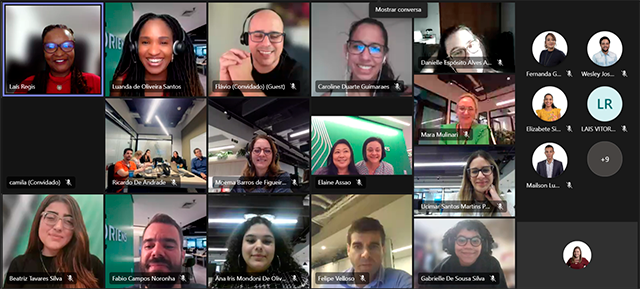On December 17, Novonor held its Annual Meeting, an event that brings together leaders from the Group’s companies to...
Do you know how to be an ally in the anti-racist struggle?
DATE: 12/08/2022
This week Horiens promoted another chat with its members about diversity and inclusion. The theme was the anti-racist struggle, alluding to the National Black Consciousness Day, celebrated on 11/20, and the special guest was psychologist Lais Vitoria-Regis, a specialist in diversity who has worked on several projects around the world.
The National Day of Black Consciousness is an affirmative act that highlights the importance of the history of black people in the construction of Brazilian society. It is a date that represents a space for reflections to combat racism and promote equity, contributing to a better, fairer, and more inclusive present and future for all.
Diversity, equity and inclusion: concepts that complement each other
Lais began the meeting by clarifying terms related to the anti-racist cause, such as the concept of diversity, which is linked to representation; equity, which means equal conditions and access, and inclusion, which relates to inclusive culture, which is when people truly feel they belong in the environment.
“Include does not mean assimilate. Inclusion is challenging because it is a concept that involves change. In the case of equity, we need to intentionally give opportunities. If we don’t put intention, equity will only be achieved in centuries,” Lais pointed out.
History and challenges
In Brazil, the first diversity actions were brought by American companies with Brazilian branches, but initially they were very focused on gender diversity and inclusion of people with disabilities.
Today, important advances can already be seen in the anti-racist fight, with greater mobilization of society and concrete actions, such as the quota law, which significantly increased the access of black people to universities. “So-called affirmative action is the way to generate change. They are concrete measures with practical effects to reduce or eliminate inequalities that have been imposed and have become structural,” explained Lais.
What is racism?
Racism is the act of associating moral qualities to a person from their phenotypic characteristics. “A still very present form of racism in everyday life are what we call microaggressions, a subtle type of discrimination that can occur both intentionally and unintentionally. And, regardless of the intention, they affect the psychological well being of these people,” Lais detailed.
To understand more about microaggressions in the context of the anti-racist struggle, watch the video “On microaggressions and reactions,” from Gabi DePretas’ YouTube channel “Gabi Oliveira” (@gabidepretas). Click here to watch.
To understand more about racism, which is considered structural in Brazil because it is rooted in society from hundreds of years of slavery, watch the YouTube channel video “Quebrando o Tabu”, with Preta Araújo. Click here to watch.
How to become an ally to promote change
The black population represents more than 50% of Brazilians, but do you usually see this representation in your day to day life, at work, in universities, in restaurants, in the places you go?
The proposal of this reflection, brought by Lais, is to stimulate people’s critical eye. “Structural racism exists, recognizing this is the first step to promote, together, the necessary changes,” she says. “The struggle is for everyone, not only for the black population. Know, research, be active and engaged, be an ally in this fight. As the philosopher, writer and activist Angela Davis says, in a racist society it is not enough not to be racist. It is necessary to be anti-racist,” she points out.
Check out steps for conscious inclusion:
Know and recognize
Racism is a reality, study the subject and recognize it in order to act
Take responsibility
Inform yourself, seek knowledge, read black authors, be engaged
Listen to
Listen to people who have different stories than you
Change your lenses
Question, perceive your own lenses
Apologize
No one is exempt from making mistakes, so if you make a microaggression, correct it by always exercising the empathic look to consolidate behavior change
Be an ally
No matter if you are not black, take action, help bring about change
Diversity and inclusion are pillars of Horiens’ culture and, in order to give voice and stimulate awareness and affirmative actions, in 2020 the Diversity and Inclusion Committee was created, composed of members from several areas of the company who, together, bring ideas and collaborate to encourage access, space and respect, consolidating an increasingly plural work environment.



No comments